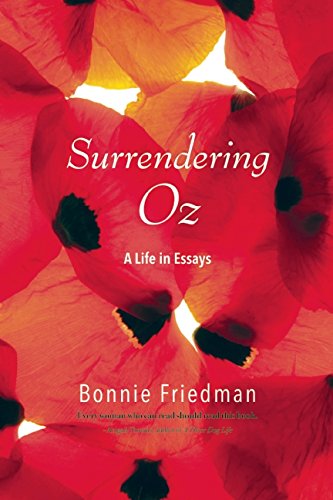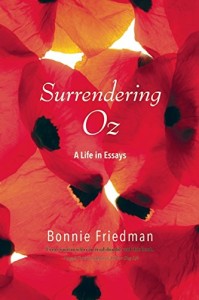
What the Wicked Witch Taught Her
 Taken together, the pieces by Bonnie Friedman in Surrendering Oz: A Life in Essays, just out from Etruscan Press, form an autobiography of sorts, one in which we follow the progress of a shy, bookish Jewish girl as she slowly but surely comes into her own. From the Bronx bedroom she shares with her older sister to the thoroughfares and cities of the wider world, we watch as the girl grows and gains confidence, both as a writer, and as a woman. The essays that chart her growth—she’s now 56—have an internal sequence all their own, determined by their emotional valence, not the calendar. Dorothy from Kansas and Gertrude Stein, Victoria’s Secret and bedbugs—in Friedman’s skilled hands, the quotidian stuff and mess of the world come together in a benign—and even divine—order. Fiction Editor Yona Zeldis McDonough asked Friedman about the singular faith that infuses every single page of this indelible book:
Taken together, the pieces by Bonnie Friedman in Surrendering Oz: A Life in Essays, just out from Etruscan Press, form an autobiography of sorts, one in which we follow the progress of a shy, bookish Jewish girl as she slowly but surely comes into her own. From the Bronx bedroom she shares with her older sister to the thoroughfares and cities of the wider world, we watch as the girl grows and gains confidence, both as a writer, and as a woman. The essays that chart her growth—she’s now 56—have an internal sequence all their own, determined by their emotional valence, not the calendar. Dorothy from Kansas and Gertrude Stein, Victoria’s Secret and bedbugs—in Friedman’s skilled hands, the quotidian stuff and mess of the world come together in a benign—and even divine—order. Fiction Editor Yona Zeldis McDonough asked Friedman about the singular faith that infuses every single page of this indelible book:
YZM: Did you write these essays with the goal of gathering them into a book? Or did their coming together in a single volume happen after they had been written?
BF: I wrote these essays over many years, always in the grips of a presiding passion — something I needed to figure out in my own life but that I thought reflected something unspoken or unresolved in the lives of other women. Late in the process I saw that the essays connected up – they all concern how one learns to think for oneself, how one gains possession over one’s own life. Once I saw that, I believed I might have a book.
YZM: You offer a brilliant, feminist interpretation of the film The Wizard of Oz; do you feel its messages have particular meaning for Jewish women?
BF: Historically, shtetl women were allowed take on a larger role in running the family and even the business so as to free up the husband to study Torah, if possible. The spiritual was privileged over the pragmatic, and to some extent this allowed women to take on a more vigorous role out in the world. But gender roles in America were different. I grew up in the Bronx in a Jewish neighborhood, and I marveled at the version of femininity I saw on TV and in old movies, with its demure reticence and picturesque helplessness. It didn’t match up with the way I saw women behaving in the streets and classrooms around me. And yet, of course, television is our school, especially when we are young, and we unconsciously absorb its values. In The Wizard of Oz, Aunt Em talks about how, being a “good Christian woman,” she can’t tell the town bully, Elvira Gulch, what she thinks of her dominating ways. Nor can she advocate for Dorothy. Many of us Jewish girls, to be acceptable, learned to muffle and constrict ourselves.
One comment on “What the Wicked Witch Taught Her”
Comments are closed.




Great interview, bringing out that secularism and spirtuality are not mutually exclusive. I look forward to reading Surrendering Oz.